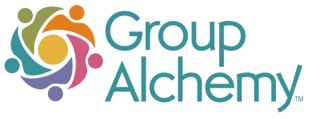Growing attention to the costs of stress means that many larger companies have created wellness programs that promote exercise and meditation and provide assistance to employees to create healthy lifestyles and learn how to cope with external sources of stress. This is great. We need more of that. Much of health and wellness is an individual affair. But – it’s not only a matter of what the individual can do.
We can do more to create positive relationships and group experiences that reduce stress and contribute to success and well-being.
There is much research that shows that happier people are more productive. They are healthier so they do not miss work and they stay at their jobs longer. A big part of being happier at work is being in positive relationships and groups. And that takes time and attention to fully engage everyone. When that doesn’t happen then the group is fractured by hopelessness.
Stress Fracture: Hopelessness
Hopelessness is about feeling stuck with no options. It means grinding through with no sense of a better future. And it creates what we know is the most damaging kind of stress – the feeling that we have no control over the problem. That’s what happens when the work situation is difficult with no visible means for making a change. And it’s a lot more common than most of us want to admit.
The stress fracture of hopelessness is fed by a syndrome that I see a lot. People aren’t sure what to do to create truly powerful groups so they just hope for the best while concluding that “people are difficult.”
Are there topics that no one is willing to raise even though it’s clear that there’s a problem? Maybe you’re afraid to open a discussion about how things are going because you’re afraid of opening up an argument. Are your meetings so full and exhausting that you don’t know how to make room for the open and honest communication needed in order to clear the air and find more creative ways to work together? Maybe your meetings could use an overhaul to make them more effective and energizing.
In reality there’s plenty we can do about creating happy, productive groups . If our groups are difficult it’s because we allow them to be. The simple fact is that groups need structure and processes that facilitate people coming together in constructive ways rather than competing to have their own way. Without structure, people are left to do whatever they choose.
If there is a sense of hopelessness or just being stuck in your group then a great place to start the change process is by learning something new.
Solution: Mastery
Mastery is about learning new things and developing new skills. In this case the focus is on learning specific techniques for building strong groups. It might be as simple as learning facilitation methods to improve the efficiency and effectiveness of your meetings. Or it might be learning about group dynamics and creating a distinctive experience for your group members to try some new ways of working. It can be an extended program but even short exercises can be very powerful. (See Chapter six in Group Alchemy: The Six Elements of Highly Successful Collaboration for more suggestions.)
Just yesterday I led a group in an exercise to learn a decision-making model based on personal learning and problem solving styles. They had fun and were excited by what they learned about the differences between their personal approaches to solving problems while also learning a lot about the power of their collective talents. They now have a new language and a model to help them combine their perspectives and strengths. It took about twenty minutes.
Making a habit of learning and developing new skills in group dynamics and culture keeps people growing and offers options. You don’t have to be stuck with difficulties when you all are learning to expand your personal and collective repertoire. That makes the experience of working together illuminating and energizing.
Where to start? I suggest looking at where you experience a stress point and identify a gap in understanding or knowledge. Then identify a book, course, exercise or program that will take you on a learning journey. Or just choose something that you are curious about that you think could help you all work together more effectively.
If it’s something the group can do together that is always best. But minimally you can do something on your own like read a book and share what you learn.
A routine and habitual mastery practice will work to keep people inspired. I notice that my clients always list things they want to learn about I ask them what they want in order to stay inspired about their work.
The key is always bringing people together with intention to create the work environment that supports everyone’s success.
Whatever you choose to do, please take action today. Try something different that can relieve any stress in your work.
Your health depends on it.
